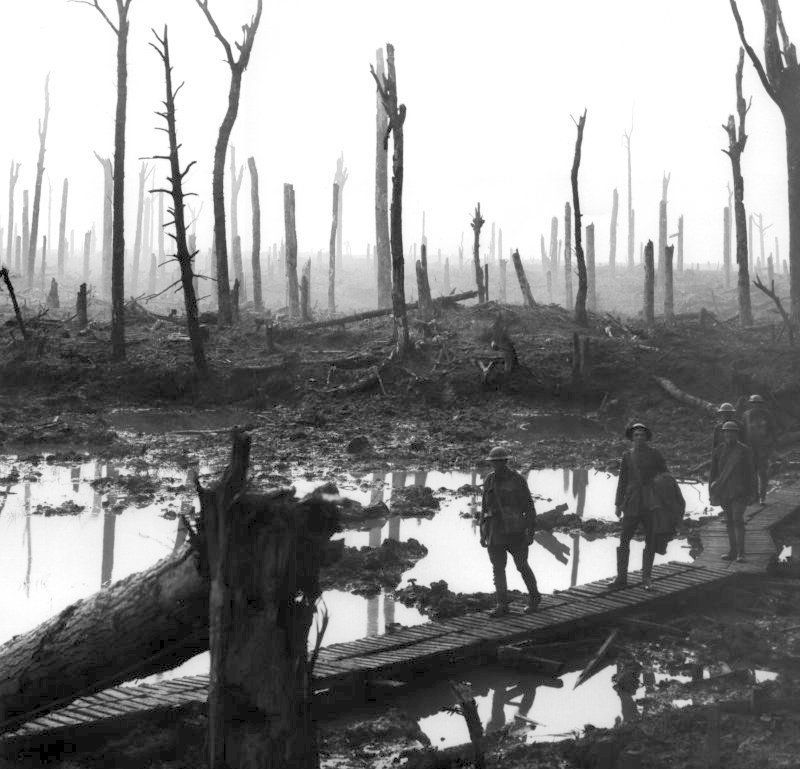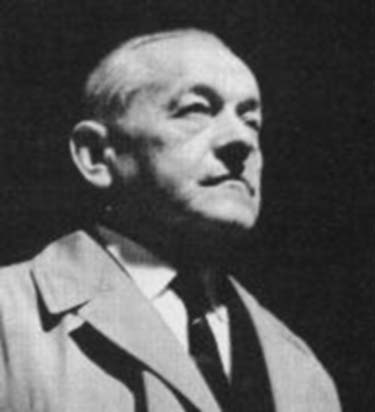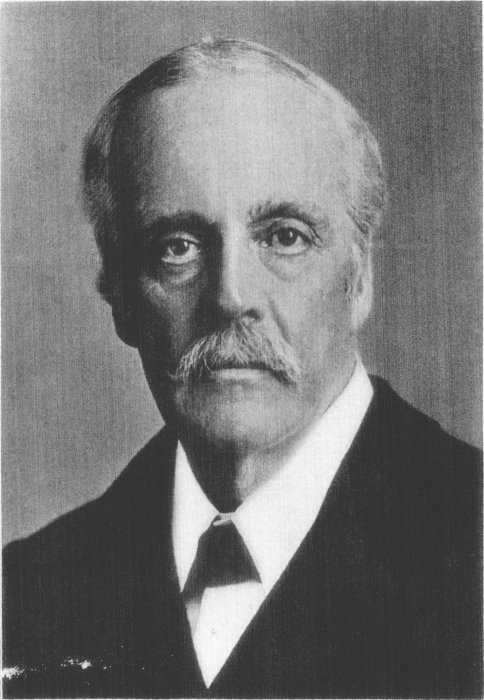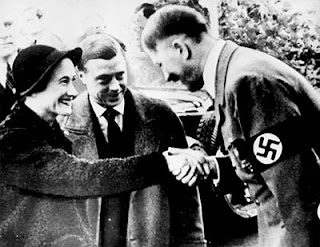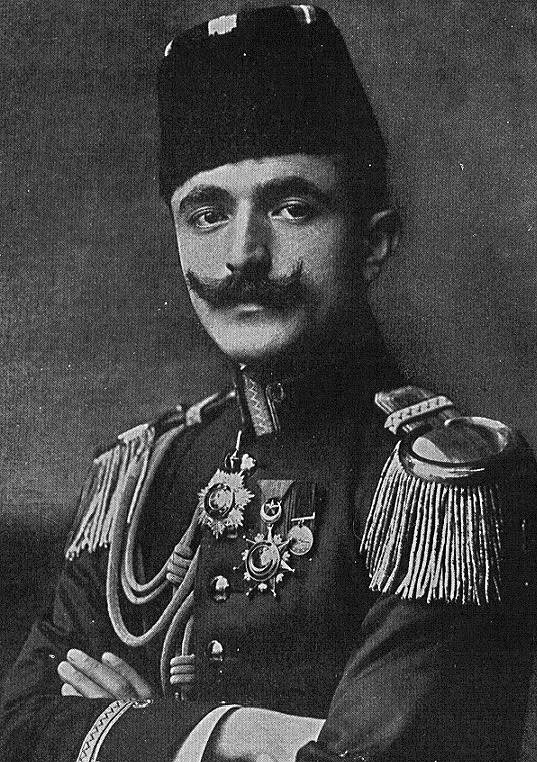
ISMAIL ENVER PASHA, Germany's ally, when Armenians massacred.

ORHAN PARMUK , Nobel prizewinning author, not safe in Turkey.
"Who, after all, speaks today of the annihilation of the Armenians?".
Thus Adolf Hitler is alleged to have assured his senior military commanders of impunity, in a speech on August 22 1939, a week before the invasion of Poland, when he urged them to be ruthless in wiping out civilians, so as to create lebensraum for Germans.
Whatever Hitler said, he was wrong.
His speech itself, said to have been recorded in unofficial notes by Admiral Canaris, is the subject of denial, Turkish officials claiming the remark was invented by Armenian propagandists. Almost a century after the events in May 1915, which led to the death of over a million Armenians, and spurred the flight of refugees to form the bulk of today's Armenian diaspora, the Armenian tragedy remains the subject of fierce controversy.
In the United States, leading Jewish organisations lobbied against the official recognition of the Armenian genocide, it was said because of threats to Turkey's Jewish community, but a more likely reason was their taking a lead from Israel, which valued Turkey as an ally in the Middle East, as did the United States of course. It may be a coincidence, but only since the Mave Marmara incident has the Congress Foreign Affairs committee been persuaded to describe the 1915 massacre as genocide.
Many Armenian refugees settled in Iran, now home to 100,000 Armenians. The former Soviet Armenia and Iran have important trading relations, including a pipeline, supplying Iranian natural gas. The Islamic Republic has been supportive of Armenia in its conflict with Azerbaijan. But remarks by Iranian Vice President Hamid Baghaei, that the Turkish deportation of Armenians in 1915 amounted to genocide, upset the Turkish government, and caused strains in Iran itself. President Ahmadinejad needed to reassure Foreign Minister Manouchehr Mottaki, and other government MPs, anxious to maintain and build on good relations with Turkey. While it suits Ahmadinejad to play tension with the West to counter unrest within Iran, his regime presumably feels safer if it can count on Turkey not to be the bridgehead for a threatened attack. Both governments share an interest in keeping down the Kurdish people in between.
It was Winston Churchill, then of course making war on Turkey, who used the Greek word Holocaust - originally meaning a sacrifice by fire - to refer to reported burning of Armenians in a pit, and thus gave the word its modern meaning of genocide.
In Cardiff's Garden of Peace, a memorial to the Armenians was vandalised on the eve of Holocaust Memorial Day in 2008. In November the previous year some 300 Turks had been bused to protest at the inauguration of the monument.
On September 21, 2010, the European Court of Human Rights issued a ruling that Turkish authorities failed to protect journalist Hrant Dink, a Turkish citizen of Armenian descent, who was murdered outside his newspaper's office in Istanbul in 2007. The Court found that the authorities violated Dink's rights in 2005 when they prosecuted him for "denigration of Turkishness", because he raised the Armenian issue. The journalist was subjected to a hate campaign by the nationalist right, but the authorities failed to act on information they received that could have prevented his murder, the court says, and failed to investigate the role of state officials in his death.
Best-selling writer Orhan Pamuk, who won the Nobel prize for literature in 2005, the first Turkish citizen to win a Nobel, brought a storm on his head when he told a Swiss interviewer: "Thirty thousand Kurds have been killed here, and a million Armenians. And almost nobody dares to mention that. So I do." Pamuk's books were burned at right-wing rallies, and the government brought in a new law, Article 301, which states: "A person who, being a Turk, explicitly insults the Republic or Turkish Grand National Assembly, shall be punishable by imprisonment of between six months to three years."
When the attempt to prosecute Pamuk retroactively failed, partly because of international reaction, the far Right plotted to assassinate him along with other enemies. Orhan Pamuk has not retracted anything he said, but he no longer resides and works in his homeland.
It has been the contention of Turkish governments and their apologists that the May 1915 deportations and killings were just part of the war, in which Armenians sided with Russia and fought against Turkish rule, and atrocities were committed on both sides; that the numbers of Armenian dead have been exagerated; and that Armenians today are just raising the issue for gain, or from malice against Turkey. Why they should do so, or why Turkish people today should feel responsible for the deeds of a long-gone regime, is not obvious. Reading the more aggressive writings of Norman Stone, a British historian (and former adviser to Mrs.Thatcher), who has made Turkey his home, and denial his business, one is reminded of David Irving in a bad mood.
Armenians had lived under Ottoman Turkish rule for centuries, but the 1915 catastrophe was not the first massacre. Towards the end of the 19th century, the Turkish empire had lost most of its Balkan lands to national freedom struggles, which were backed by Tsarist Russia, and marred by massacres of Muslims, while Christians were slaughtered in turn when the empire unleashed its irregular bashi bazouks. Faced with the expanding Russian Empire taking Armenia under its wing, and Armenians within Turkey demanding civil rights, Sultan Abdul Hamid II declared that the Christian world was out to destroy his empire, and he did not distinguish between Armenian militants and Armenian citizens in general. In eastern Turkey an armed band known as the Hamidiye was set up in 1890, formed of Kurdish irregulars who were told to "deal with the Armenians as they wished."
While some coveted the Armenians' land or assumed wealth, the authorities hit them with heavy taxes provoking unrest which brought a military response. In some places the Armenians fought off the forces sent against them and in 1895 they brought their plight to the attention of the Great Powers who were interested in Ottoman affairs. The Sultan signed reforms, but his police broke up an Armenian rally, and he unleashed a series of pogroms and massacres in which at least 100,000 Armenians were killed. In some places, Muslim Turks defended their neighbours, but at Urfa Ottoman troops set fire to the cathedral in which 3,000 people had sought sanctuary. In Istanbul, where Jews had sheltered Armenians in their homes the mob stormed a synagogue on Yom Kippur in 1897.
In 1908, Abdul Hamid was forced to step down when part of the Army threatened to march on the capital, and the 'Young Turks', or Committee of Union and Progress (CUP), took over the country. The new leaders were secularists, including men of Jewish origin. Their government was committed to modernising the state, and it was welcomed by Turks, Armenians, Greeks, Jews and Arabs alike, glad to see the back of the Sultan. A counter-coup by more reactionary officers of the military who wanted the Sultan back, supported by Islamic theological students who wanted sharia law, led to new attacks on the Armenians. Thousands were killed in Adana. But the CUP managed to suppress the rising, and court-martial its leaders. In 1912 the sultan, self-claimed defender of the Faith, was sent off to Salonika.
That year the opposition Liberal Union took office, with support from Armenian and other minority parties opposed to the CUP's centralised power. But the CUP came back with a vengeance, in 1913, executing or exiling its opponents. By 1914, when Turkey entered the First World War, and the following year when its government launched their onslaught on the Armenians, it was being run by a triumvirate - War Minister Enver, Interior Minister Talat, and Navy minister Cemal - the three pashas. Western investment and influence had been growing for some decades, and these three were allied to one particular European power.
Mass killings are as old as the hills, mentioned and even exhorted in the Bible, and we need only think of those who suffered and died in the Atlantic slave crossing to put other ordeals in perspective. But it was in supposedly enlightened, modern times that states gave themselves the right to deport entire populations, and acquired the means to organise mass slaughter, even turn it, as we know, into an industry.
Genocide in South West Africa
Neither Jews nor Armenians were the first victims of 2oth Century genocide. That honour belongs to the Herero and Namaqa poples of what is now called Namibia. In 1904 they rose up against the growing German colonisation of their country, where they faced loss of their land and cattle, being forced into reservations or working in bondage to the settlers. The Herero leader Chief Samuel Maharero told his warriors to avoid killing Englishmen and Boers, or women and children in general.
In contrast, the German commander General Trotha wrote a letter before the battle of Waterburg against the Herero:
“ "I believe that the nation as such should be annihilated, or, if this was not possible by tactical measures, have to be expelled from the country...This will be possible if the water-holes from Grootfontein to Gobabis are occupied. The constant movement of our troops will enable us to find the small groups of natives who have moved backwards and destroy them gradually.".
Jan Cloete, who had been acting as a guide for the German troops, witnessed what happened. "After the battle all men, women, and children who fell into German hands, wounded or otherwise, were mercilessly put to death. Then the Germans set off in pursuit of the rest, and all those found by the wayside and in the sandveld were shot down and bayoneted to death. The mass of the Herero men were unarmed and thus unable to offer resistance. They were just trying to get away with their cattle." ”
Some Herero managed to cross the desert and reach Botswana. But General Trotha deployed his troops to prevent Herero in the desert from reaching wells, and even poisoned some well water. Up to 100, 000 Herero and 10,000 Nama were killed. Many were also herded into concentration camps, where without adequate food, they were worked to death, and some were used in medical experiments. Skulls were sent to German universities, displayed in scientific lectures on the superiority of the white race.
Namibia wrested its independence from South Africa in 1990. In 2001 Hereros filed a lawsuit in the United States demanding reparations from the German government and the Deutsche Bank, which financed the German government and companies in Southern Africa. On August 16, 2004, at the 100th anniversary of the start of the genocide, Germany's Minister of Economic Development Heidemarie Wieczorek-Zeul, officially apologized, :
“ We Germans accept our historical and moral responsibility and the guilt incurred by Germans at that time."
Germany arrives at the table
Having come late to the table, Imperial Germany had obtained only scraps in the struggle for overseas colonies. But without overcoming British naval supremacy it could turn elsewhere, expanding its domain without necessarily having to raise its flag.
At the 1878 Congress of Berlin the Powers sought to limit Russian expansion but extend influence over Turkey. Within four years the first German military mission arrived in Constantinople, with then Major, later Field Marshall, Von der Goelz as instructer to reform the Turkish army, and Krupp to supply the hardware.
At Heidelberg, Professor Aloys Sprenger, who had travelled widely in the East, including India, and written on "The History of Military Science among the Muslim Peoples", produced a new tract in 1886: "Babylonia, the Richest Land of the Past, and Most Remunerative Field of Colonisation in the Present". Later an artillery officer, Kannenberg, wrote on "Asia Minor's Natural Riches".
The importance of Middle East oil was just dawning. Russia had opened the Baku oilfields for exploration in 1872, and in 1901 an Englishman called D'Arcy started prospecting in Iran. But German geo-strategists had a bigger picture. In 1878, Austria-Hungary occupied Bosnia and Hercegovina, and in 1882 Germany and Austria-Hungary became allies. It only remained to bring Turkey on side. In 1888 the Sultan awarded a railway contract to a German company, In 1898, discussions began on the Baghdad railway. With finance arranged by the Deutsche Bank, this would run from Berlin to Baghdad, ennabling oil and mineral ores to be sent back to Germany, while a spur extended to Basra would bring German power and manufactured goods to the Gulf. The British in India, still playing the Great Game of spying and intrigue against their Russian rivals in Asia, began to realise they might face a new foe in common, one that could both sidestep and threaten the Suez canal. .
In 1889 and again in 1898 Kaiser Wilhelm II paid visits to Turkey. Some people in Germany protested the pogroms against Armenians in Turkey, but they did not have any influence on foreign policy. Chancellor Bismarck dismissed the "hypocrisy" of Russia and Britain in raising the issue. A theologian accompanying the Kaiser on his trips, Friedrich Naumann, observed that German interests required "our political indifference to the suffering of Christians in the Turkish Empire, piainful as these must be to our private feelings."
In both Istanbul and Jerusalem in 1898, the Kaiser was visited by a Viennese journalist called Theodor Herzl, soliciting his support for the Zionist project. Nothing came of the meetings, though Herzl used them to boost his prestige. In Damascus, the Kaiser proclaimed himself the champion of the world's 200 million Muslims.
In 1901, Herzl got the audience he had been seeking with the Sultan. The founder of political Zionism promised - on what basis we don't know - that Jewish finance would pay Turkey's national debt if the Sultan blessed the Zionist project in Palestine. Abdul Hamid told him "if one day the Islamic State falls apart then you can have Palestine for free, but as long as I am alive I would rather have my flesh be cut up than cut out Palestine from the Muslim land."
Kaiser Wilhelm called Abdul Hamid " a blessing for his subjects -except for a handful of Armenians", and later complained about the Young Turks "they dethroned my friend the sultan". It was said a secret wireless link had been set up from the sultan's Yildiz palace to Berlin. Abdul Hamid was allowed to send his agents to Berlin to counter reports of massacres. German embassies in Russia, Britain and France collected information on Armenian nationalist activities so the Ottoman authorities could be informed. When the sultan was deposed the links remained.
On August 3, 1914, Enver Pasha signed the secret treaty allying Turkey with Germany. On the Mediterranean, early on August 4, Rear-Admiral Wilhelm Souchon, commanding the German warships Goeben and Breslau, which had been assigned to attack French transports from Algiers, received orders from Admiral Alfred von Tirpitz:: "Alliance with government of CUP concluded August 3. Proceed at once to İstanbul."
On August 16, having slipped past the Royal Navy ships which had orders to tail but not attack, the Goeben and Breslau reached Constantinople. The Turkish government was still bound by official neutrality not to allow belligerents through the Straits. In a small ceremony, the German crews donned Turkish fezzes, and their ships were transferred to the Turkish flag, becoming the Yavuz Sultan Selim and the Midilli. Admiral Souchon remained in command, and on September 23 he was appointed commander in chief of the Ottoman Navy.
At the end of October the Goeben, Breslau and a squadron of Turkish warships sailed to attack the Russian Black Sea ports of Novorossiysk, Odessa and Sevastopol. At Novorossiysk the Breslau's guns sank 14 steamers in the harbour, and set 40 oil tanks on fire, sending streams of burning petroleum through the streets. Russia declared war on the Ottoman Empire on November 2, France and Britain following on November 5. Thus two ships began the events of war that would topple the Ottoman empire, along with its Russian enemy, and entirely change the map of the Middle East.
Between Tsar and Kaiser
Before the war, the Russian government had been preparing an international conference on Armenia, and urged the Armenian nationalists to show restraint, so they would appear as victims rather than revolutionaries. But in the Summer of 1914, as well as sending Armenian conscripts to its western front in Europe, the Russian imperial army set up Armenian volunteer units to fight in the Caucasus. The Armenian national liberation movement also formed partisan units. In December, Tsar Nicholas II visited the Caucusus and was received by the head of the Armenian Church and Armenian nationalists in Tiflis, the Georgian capital. There he proclaimed:
"From all countries Armenians are hurrying to enter the ranks of the glorious Russian Army, with their blood to serve the victory of the Russian Army... Let the Russian flag wave freely over the Dardanelles and the Bosporus, Let your will the peoples [Armenian] remaining under the Turkish yoke receive freedom. Let the Armenian people of Turkey who have suffered for the faith of Christ receive resurrection for a new free life..."
Many Armenians must have felt a wry contempt for this glorious 'Christian' liberator annexing their freedom struggle just as his regime had annexed their land. In 1905-7 the Tsarist regime had responded to strikes and unrest in the Baku oilfields with its usual divide and rule methods, encouraging Muslim Azeri pogroms against the Armenians, just as in Odessa its mob targeted the Jews.
The top German agent in the Middle East, Max Freiherr von Oppenheim, who may have inspired the Kaiser's speech as 'protector of Islam', had also urged that in the event of war the Turkish government must proclaim jihad. The CUP had been materialists, with little time for religion, but now Enver Pasha persuaded the Sultan, still head of the Caliphate, to declare jihad. The aim was to stir Muslim revolt against Britain and its allies, but there were implications for non-Muslim minorities within Turkey. Some religious Muslims resented the use of their religion to cloak political aims, seen when converts to Islam were not exempt from persecution by the state.
Enver Pasha blamed Armenian resistance and sabotage for the defeat of Turkish forces in the Caucasus at the end of 1914 nd beginning of 1915. He might just as well have blamed the mountain winter, for which his forces were ill-fed, ill-clad and unprepared.
On February 25, 1915, Enver ordered that all Armenians serving in the Ottoman forces should be disarmed and sent to labour bttalions, the ameles. Thus those conscripted were neither able to defend their home towns and families or themseves.
Special units, many of them recruited from convicts, were formed for action against the Armeninians. At Van, where the Armenians were in a majority, they resisted after nearby towns and villages had been cleared, holding out from April 20, for three weeks until they were relieved by the arrival of Russian forces under Genberal Yudenich.
On April 24, Interior minister Mehmed Talat passed the order claiming that the Armenians had rebelled against his government. Some 250 Armenian intellectuals and community leaders in Istanbul were taken from their homes and placed in special holding centres. Elsewhere, Armenians were being forced on long marches, without food or water, into the Syrian desert. The guards who escorted them were often from the special detachments, and only too ready to attack, dob and rape those they were guarding.
Satisfied that "the deportation of the Armenians has been decided", General Fritz Bronsart von Schellendorf at army GHQ., thought he understood the way these helpless people were being treated:
"...the Armenian is just like a Jew, a parasite outside the confines of his homeland, sucking of the marrow of the peoples of the host country. Year after year they abandon their native land -just like the Polish Jews who migrate to Germany -to engage in various activities. Hence the hatred which was,in a medieval form, unleashed itself against them s an unpleasant entailing their murder. "
In fact there is evidence the hatred was neither spontaneous nor universally shared. A secret order, revealed at a post-war court martial, said that "any Muslim who dares to harbour an Armenian will be hanged in front of his house". It also warned any official or officer who broke ranks with the policy they would be stripped of their rank and court-martialed.
From Erzurum, in June, officers reported that young Armenian men had either been conscipted for labour battalions or shot. No bombs or weapons had been found in house to house searches , and there was no sign that the Armenians were preparing am uprising. Bronsart still insisted on the "military necessity" of deporting women, children and old men.
On June 17, 1915 German ambassador Wangenheim informed Berlin that Armenians from Dyarbakir who were supposed to be deported to Mosul "were en route to be slaughtered".
On June 29 he testified "The deportees are being set upon and butchered"
On July 7, he concluded that " the manner in which deportees being treated...shows that the government is in fact pursuing the goal of annihiliating the Armenian race in Turkey".
The forces sent to remove the Armenians sometimes found shorter ways than taking them on long marches. The Italian consul at Trabzon in 1915, Giacomo Gorrini, writes: "I saw thousands of innocent women and children placed on boats which were capsized in the Black Sea". An affidavit presented in post war trials in Trabzon described how Armenian villagers were burned. "The shortest method for disposing of the women and children concentrated in the various camps was to burn them." ... "Turkish prisoners who had apparently witnessed some of these scenes were horrified and maddened at remembering the sight. They told the Russians that the stench of the burning human flesh permeated the air for many days after."
US ambassador Henry Morgethau tried unsuccessfully to intercede with the Turkish authorities for the Armenians, and reported to Washington what was being done. "Early in July 2,000 Armenian "ameles" were sent from Harput to build roads. ...practically every man of these 2,000 was massacred".
Some Germans were shocked by what they saw. Dr.Walter Rossler, the consul in Aleppo, said he could not believe his eyes when he read an official document referring to "temporary relocation" of Armenians. He relayed to the Chancellor in Berlin the account of a German cavalry captain who had witnessed the slitting of throats of young Armenians in a labour battalion, and seen hundred of corpses by the roadside in September 1915.
But Colonel Felix Guse, IIIrd Army chief of staff described the Armenians as a people deserving "punishment". The official line was that the Turkish authorities were protecting themselves and their country from Armenian insurrection. The German Foreign Office made sure that 191 Reichstag deputies were unable to see a report on anti-Armenian atrocities
Lieutenant Colonel Boettrich, chied of railway services at Ottoman GHQ, ordered the deportation of Armenian railway workers, engineers and clerks who had been engaged in construction of the Baghdad railway. The Armenian workers were "despatched with the knife". The Baghdad Railway which had seemed so important to the war was now delayed because so many workers and technicians had been killed
General Bronsart attacked "agitators " and "the Jew Morgenthau", for interfering. In August 1916 he put in a request to his superior, General Lyman von Sanders, for the deportation of Greeks from Turkey's coastal areas..
The Three Pashas escape trial, but not justice
Immediately after the war there trials at Harput and Trabzon, for what had
been done to the Armenians. But the big three Turkish leaders - Enver, Talat, Cemal - were among seven whom Bronsart von Schellenburg and Lt.General Seekkt assisted to escape trial, if not justice of a sort.
Talat was assassinated with a single bullet on 15 March 1921 as he came out of his house in Hardenbergstrasse, Charlottenburg. His assassin was a member of the Armenian Revolutionary Federation (ARF) from Erzurum, Soghomon Tehlirian..
Cemal was assassinated on July 21, 1922, in Tiflis (Tbilisi), Georgia, by Stepan Dzaghikian, Bedros Der Boghosian and Ardashes Kevorkian, all members of the ARF. His body was returned to Turkey for burial, also at Erzurum.
Enver Pasha seemed to enjoy a second and even third life, owing to his chutzpah, but it was not to last. He showed up at the Congress of Peoples of the East in Baku in 1920, supposedly representing revolutionaries in the Maghreb, Egypt and India, and denouncing imperialism. The following year he was entrusted with a mission to Bokhara to help suppress anti-Soviet Basmachi rebels. Switching to the rebel side, he became their commander, reorganising them with Turkish officers.
On August 4, 1922, near Dushanbe, his headquarters were attacked by Red Army Bashkir cavalry, and Enver was killed by machine gun fire . As luck would have it, the raiders were commanded by Yakov Melkumov , aka Agop Melkumian, an Armenian.
Yet the book remains open on the true significance of the Armenian tragedy, and so do the wounds. We have seen how some leaders take such enormous crimes not as a warning from history but an encouragement to do it again. We have a duty to uncover and recover the truth, if 'Never Again' is to mean, as it should, never again to anyone.
(first published in Jewish Socialist No.61 Winter 2010)

